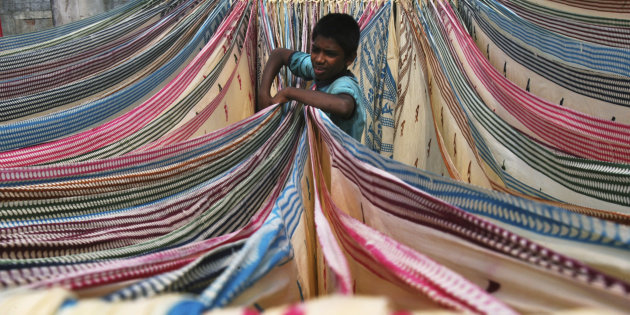-
Tips for becoming a good boxer - November 6, 2020
-
7 expert tips for making your hens night a memorable one - November 6, 2020
-
5 reasons to host your Christmas party on a cruise boat - November 6, 2020
-
What to do when you’re charged with a crime - November 6, 2020
-
Should you get one or multiple dogs? Here’s all you need to know - November 3, 2020
-
A Guide: How to Build Your Very Own Magic Mirror - February 14, 2019
-
Our Top Inspirational Baseball Stars - November 24, 2018
-
Five Tech Tools That Will Help You Turn Your Blog into a Business - November 24, 2018
-
How to Indulge on Vacation without Expanding Your Waist - November 9, 2018
-
5 Strategies for Businesses to Appeal to Today’s Increasingly Mobile-Crazed Customers - November 9, 2018
Child labour law passed
The current law prohibits children under 14 from working only in hazardous jobs, although even this is not properly implemented, according to activists.
Advertisement
Giving employment to a child below 14 years of age in any occupation or processes except where the child helps his family will now invite a imprisonment of up to two years under the provisions of the Child Labour (Prohibition and Regulation) Amendment Bill which was passed by Parliament on Tuesday. The bill now goes for the President’s assent before becoming law.
The Bill also provides for floating of a Child Labour Rehabilitation Fund for facilitating welfare and rehabilitation of rescued child labourers.
The U.N. Children’s Agency (UNICEF) as well as many others have raised alarm over two particular amendments – permitting children to work for their families and reducing the number of banned professions for adolescents.
But UNICEF said family or home-based work is often hazardous and includes working in cotton fields, making bangles and bidis, rolling tobacco, carpet weaving and metal work. The bill also defines children between 14 to 18 years as adolescents and bars their employment in any hazardous occupations.
Although the body welcomed the law, it expressed concern over the provision of children working in family enterprises which, it said, could further disadvantage the most vulnerable children.
The government says the exemptions aim at striking a balance between education and India’s economic reality, in which parents rely on their children to help with farming or artisanal work to fight poverty. “This amendment will affect the retention rate of children in schools and increase drop outs of marginalized especially girl children”, Rai says, adding, “Goal 4 of Sustainable Development Goals (SDGs) declared by United Nations is also pushing for the universalization of education till the secondary level”.
As per data presented in form of answer about child labour in Rajya Sabha in 2014, the number of child labourers decreased by 65% – from 1.26 crore to 82.2 lakh (aged between 5 – 14 years) between Census 2001 to and Census 2011.
Advertisement
UNICEF had urged India to exclude family work from the proposed law and include an “exhaustive list” of hazardous occupations. Please credit the Thomson Reuters Foundation, the charitable arm of Thomson Reuters, that covers humanitarian news, women’s rights, trafficking, property rights and climate change.





























